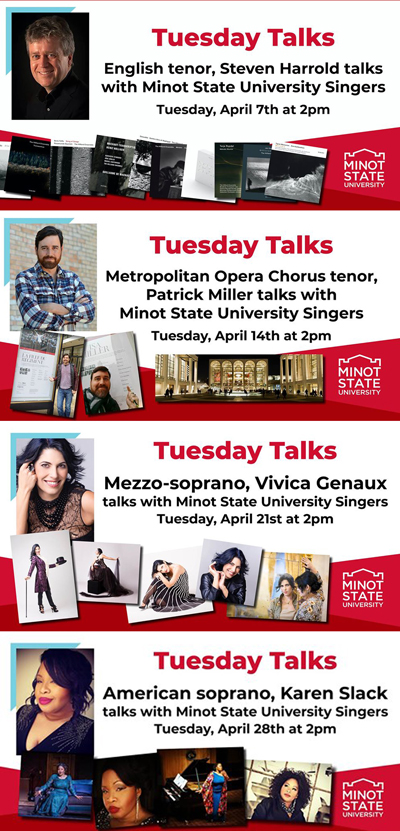Eads brings a virtual world of music to Minot State

By Michael Linnell
University Communications Director
michael.linnell@minotstateu.edu
MINOT, N.D. – When Minot State University made the decision to go to online delivery only, the extrovert in Emerson Eads panicked.
Being an extrovert, this time has been rather excruciating,” he said. “My need for human connection, for collaboration, for community, has only increased. I keep telling my students, I want them to use their video cameras during meetings so I can see their faces. You don’t realize how special it is to be able to make music together every day until it’s taken away like this.”
But the pragmatic side of Eads, Minot State’s director of choral activities, saw an opportunity.
Each Tuesday during the second half of the semester, Minot State University Choirs has sponsored Tuesday Talks, connecting singers from around the world with MSU via remote technology.
Eads believes both his students and the guest singers have benefited from the experience.
“Not only has the response from these professional singers been overwhelmingly positive, the wisdom and counsel they have shared with me and my students has been truly overwhelming,” he said. “Seeing a professional, who we tend to idolize, deal with the same garden-variety afflictions, like self-doubt, stage-fright, vocal health complications, etc., can be incredibly encouraging for a young singer.”
Minot State music education major Joanna Miller agrees.
“It was amazing to get to hear their experiences and learn about the pathways they took to becoming professionals — none of which were the same,” she said. “It was like getting the chance to have a weekly master class, which we're lucky to get one per year under normal circumstances. These Tuesday Talks were an excellent reminder to me why I am pursuing music education, why music means so much to our world, and that unorthodox pathways can lead to great things.”
Steven Harrold, an English tenor with The Hilliard Ensemble and The Tallis Scholars ,started the sessions on April 7. He was followed by Metropolitan Opera Chorus tenor Patrick Miller on April 14, Vivica Genaux, a mezzo-soprano who hails from Eads’s home state of Alaska, met with MSU Singers on April 21, and the final installment featured Karen Slack, an American soprano, on Tuesday.
Eads relied on a vast library of friends and colleagues for the guest lectures.
“The artists that I’ve chosen for guest lectures are artists who I have had the pleasure to know or make music with,” Eads said. “It occurred to me fairly soon into this online-teaching time, that I had lifelines that I wasn’t using, and that perhaps friends and artists who were furloughed during this time might have time and the need to connect with others in this way. As an undergrad in Alaska, I had so many wonderful opportunities to share musical opportunities with really top-shelf artists who were always so generous with their time and advice.”
The biggest drawback for the music department in online delivery is personal interaction and Eads style personifies that, using immediate feedback and connection to each individual student, to get maximum results.
“When I lecture, I’m interactive, I ask questions, I try to connect with students — the delay and lack of immediate connection is the toughest thing for me,” Eads said. “However, as a choral director, it is very difficult to recreate a collaborative experience (online). Just try clapping together on a Zoom business meeting and you’ll see what I mean.”
But, he feels the online Q&A with professionals suits this format perfectly.
“So, thinking about how to best use this time, I decided to use my lifelines: my professional singing friends. They all have very diverse careers and paths which led them there. So I figured this would be a perfect time to take advantage of lagging internet and less than perfect music collaborating mediums and interview these singing professional,.” said Eads. “This allows for Q&A time from students, so they could perhaps glimpse a career path for themselves based off of the varied experiences of friends.”
For Miller, while there was a learning curve, the music department adjusted to make sure individual students still moved forward in their education.
“There was a larger learning curve for the instructors whose classes would never be online, such as performance-based arts, but in my opinion, the music division did an excellent job of adapting to our circumstances,” Miller said. “Our discipline requires so much integration and collaboration it was a bit of a shock to the system to suddenly not have that aspect of music making. However, I feel like I have learned a great deal about music from a perspective I may not have had the opportunity to otherwise. I truly believe this time of reflection will be invaluable to my career as a music teacher.”
While this won’t replace his interactive style in the future, he does feel it has a format in traditional teaching.
“I think this could become valuable in the future,” he said of online guest lectures. “I’m surprised I haven’t been doing it all along. When you can’t sing together, you have to figure out something. It has illuminated more available tools at my disposal. Education can only thrive in a community and music education in particular is only possible when there is a village of musicians willing to share. This has expanded my music-education village, and allowed friends to connect, and share advice, and experience with another generation.”
About Minot State University
Minot State University is a public university dedicated to excellence in education, scholarship, and community engagement achieved through
rigorous academic experiences, active learning environments, commitment to public service, and a vibrant campus life.
Published: 05/01/20




